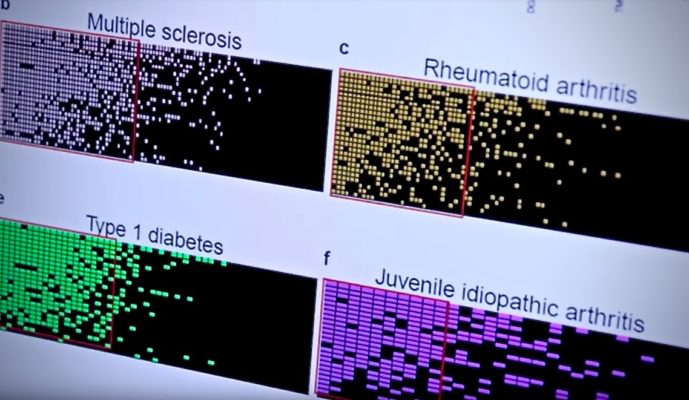A few weeks ago, we released research findings that described a connection between Epstein-Barr virus (EBV) and seven well-known diseases: systemic lupus erythematosus, multiple sclerosis, rheumatoid arthritis, juvenile idiopathic arthritis, inflammatory bowel disease, celiac disease, and type 1 diabetes.
The study was published in Nature Genetics and covered by a variety of news channels, including this story. Many people identified their own personal experiences with both EBV and one of the seven diseases. Others wondered if they should be worried if they’ve had EBV. We asked the doctors who conducted the research some of these follow up questions. We hope this additional information can help further explain the research.
1) How common is EBV infection?
As many as 95 percent of people in the United States are infected by EBV by the time they are adults. The virus infects 20 percent to 80 percent of people during childhood, depending on their life situation.
2) If someone has had mono, should they be worried?
No. Most people who have had mono will not develop one of the seven diseases. We can use this discovery to begin developing new treatments for people who do develop one of the seven diseases, but this study should not increase anxiety for people who have had EBV exposure. Of the seven diseases the only one with increased risk after developing mono is multiple sclerosis and the risk remains low even then.
3) What did you learn about the link between EBV and these seven diseases?
We now know more about how EBV can hijack the human cells it infects to cause genes to behave differently. Some of these genes may now be great targets for treatment and prevention. These results also increase the rationale and priority for the development of an EBV vaccine.
If we could eliminate EBV, we would eliminate most cases of mononucleosis and some cancers, including nasal pharyngeal carcinoma. Additionally, our study adds to previous studies to suggest that a vaccine also would decrease the incidence of multiple sclerosis (MS), lupus, and perhaps some of the other diseases mentioned in the study.
4) What is the next step in your research?
We are not vaccine researchers, so we will let other people lead this important effort to eliminate EBV infection. For our team, we are extremely interested in learning more about how viruses and genes work together to alter disease risk. This knowledge is highly likely to be important for new therapies and preventive strategies.






